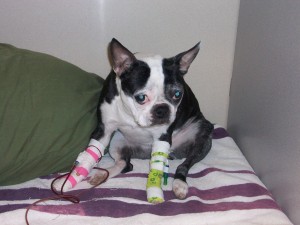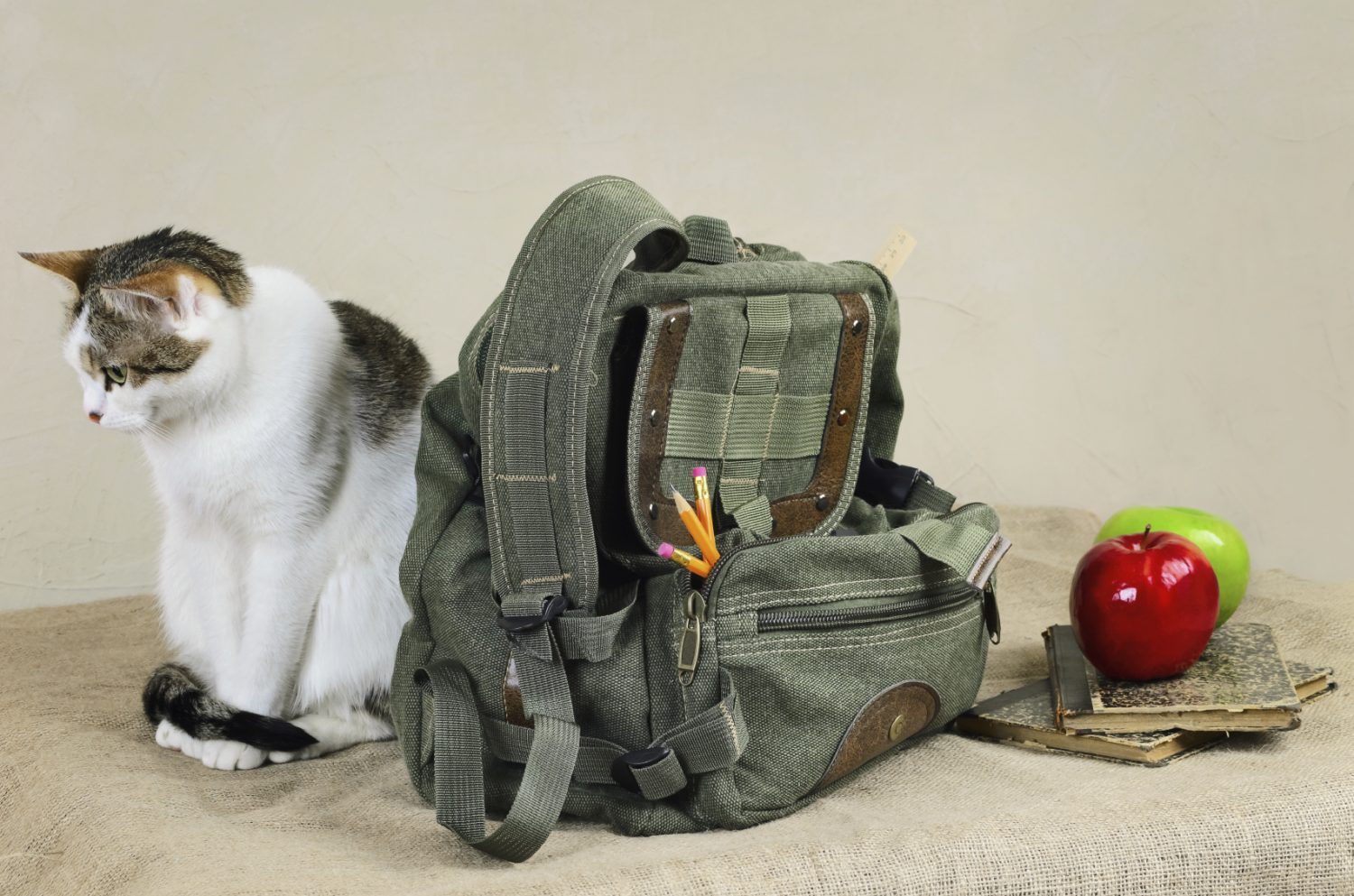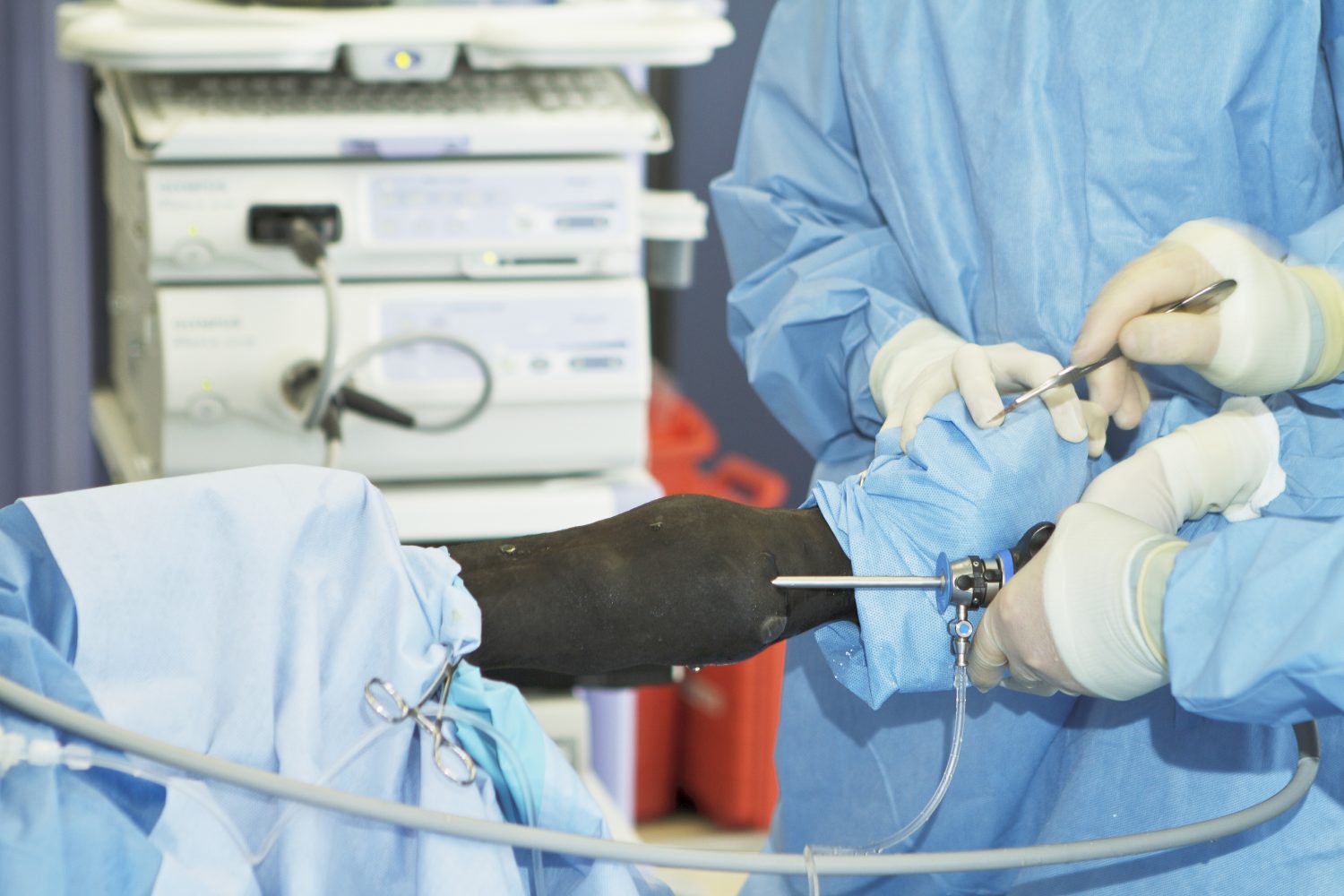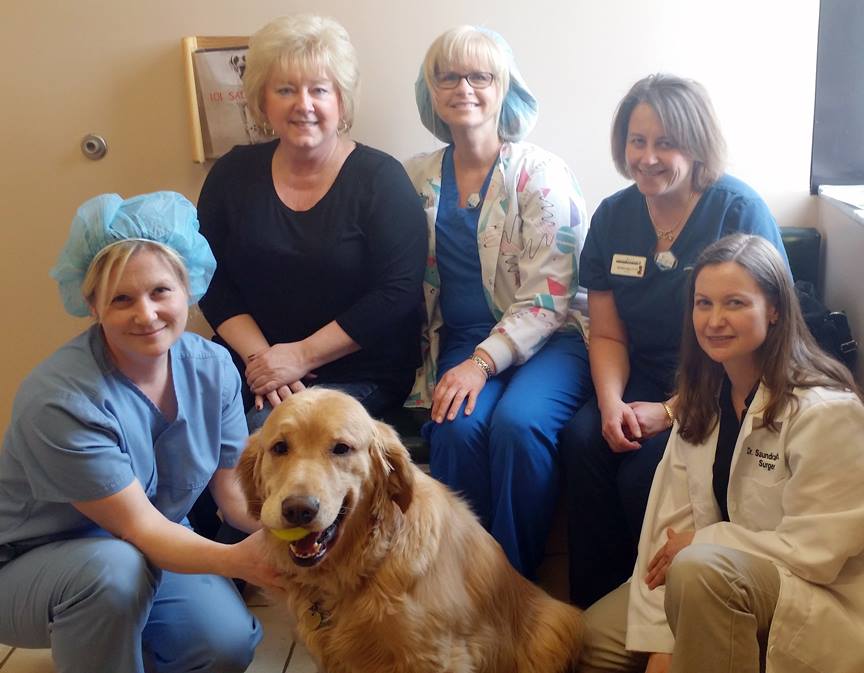Search Results for ‘liver’
Immune-Mediated Hemolytic Anemia: What Dog Owners Need to Know
 As a pet owner, nothing is as scary as a disease that can take our pets from us without warning, and sometimes even without cause. Immune-mediated hemolytic anemia (IMHA) is a condition that can do just that, though.
As a pet owner, nothing is as scary as a disease that can take our pets from us without warning, and sometimes even without cause. Immune-mediated hemolytic anemia (IMHA) is a condition that can do just that, though.
Although you’ve likely never heard of it, it’s important to learn what you need to know so that if you ever have a pet who is affected by IMHA you can take prompt and effective action.
What is Immune-Mediated Hemolytic Anemia in Dogs?
The name of the disease says it all. In pets affected by IMHA the immune system begins to destroy (hemolyze) the animal’s own red blood cells, resulting in anemia. Continue…
Enjoying A Safe Halloween With Your Pets
 Autumn provides ample opportunity to enjoy the outdoors and make memories with your pet. From the inimitable sound of autumn leaves crunching beneath the paws of your pooch to the poetic way your feline gazes at the early sunset, this season is a special one for all. However, with Halloween’s approach, pet owners should prepare for the possible risks that also await their pets. Sure, there is fun to be had and treats to enjoy (we’ll get to that in a bit) but caution is also necessary in order to best protect your pet and avoid pet emergencies. Read on to learn more.
Autumn provides ample opportunity to enjoy the outdoors and make memories with your pet. From the inimitable sound of autumn leaves crunching beneath the paws of your pooch to the poetic way your feline gazes at the early sunset, this season is a special one for all. However, with Halloween’s approach, pet owners should prepare for the possible risks that also await their pets. Sure, there is fun to be had and treats to enjoy (we’ll get to that in a bit) but caution is also necessary in order to best protect your pet and avoid pet emergencies. Read on to learn more.
Spooky Can Quickly Turn Scary
Many pet owners decide to keep their pets inside starting at dusk on All Hallows Eve. Pets (including black cats, of course) can be at risk when it comes to senseless Halloween pranks. Keep Your Pet Safe by keeping him or her indoors after dark. You can even create a warm and cozy den for them to snooze in away from the shrieks and chatter of trick-or-treaters. Continue…
Zoonotic Diseases and Your Pets
 Are you familiar with the term ‘zoonotic’?
Are you familiar with the term ‘zoonotic’?
Zoonotic diseases are those which can be passed between animals and humans. And, with more and more homes in the United States having pets, it is important to understand these types of diseases and how to prevent them.
Rabies
Rabies may seem like a far-fetched possibility, but a lot of people forget how scary rabies can be, and how common the disease is. The rabies virus can affect any mammal and is transmitted through saliva. In all mammals it invades the central nervous system, causing neurological signs and eventually death.
There is no cure for rabies, so it is very important keep your pet up to date on his or her vaccination. Pets who are unvaccinated and potentially exposed to rabies are recommended by the CDC to be euthanized or kept under strict isolation for 6 months. Continue…
Hidden Dangers: Potential Pet Poisons May Be Lurking in Backpacks…
 As a dedicated pet owner, we know you pay special attention to what your paw pals could potentially get into with the right recipe of curiosity, hunger and boredom. So, with kids back in school, we’d like to remind households of the hidden risks associated with pet poisons and what kids are bringing home in their backpacks and lunch bags.
As a dedicated pet owner, we know you pay special attention to what your paw pals could potentially get into with the right recipe of curiosity, hunger and boredom. So, with kids back in school, we’d like to remind households of the hidden risks associated with pet poisons and what kids are bringing home in their backpacks and lunch bags.
Can’t. Stop. Sniffing.
The smells we bring home could (and often do) drive our pets into an olfactory frenzy. Food smells, people smells, the scents from other animals… you name it, our pets are going to sniff it and catalogue it away in their brain. Your pet’s sniffer could lead to your child’s backpack where hopefully one would not discover any of the following potential pet poisons: Continue…
OVRS Keeps Growing
 Oakland Veterinary Referral Services is dedicated to providing our pet patients and human clients with cutting-edge medicine and surgery capabilities. We are proud to be one of the premier emergency, specialty and referral hospitals in Michigan and are excited to share with you that we are continuing to grow.
Oakland Veterinary Referral Services is dedicated to providing our pet patients and human clients with cutting-edge medicine and surgery capabilities. We are proud to be one of the premier emergency, specialty and referral hospitals in Michigan and are excited to share with you that we are continuing to grow.
Internal Medicine at OVRS
Pets become sick or injured, and their diagnosis and treatment isn’t always easy, especially when the problem is internal. We have more medical treatment options today, but pet owners have higher expectations for the help available to cure or heal their beloved pet.
The OVRS internal medicine department is top notch and we continue to add staff, equipment and expertise. Our existing team of outstanding internal medicine specialists are all board-certified by the American College of Veterinary Internal Medicine. Continue…
TEAR Fund: Saving Lives, One Pet at a Time
As (we hope) you know, Oakland Veterinary Referral Services has founded The Emergency Animal Relief Foundation (TEAR) as a community-supported financial assistance program for the pets and pet owners of Southeastern Michigan.
 In addition to funding public education programs and research projects benefitting animals in our area, TEAR’s primary goal is to provide financial relief to pet owners in crisis by providing emergency grants of up to $500 for animals in need of veterinary care. With the support of donors and volunteers, TEAR is able to extend these grants in an effort to prolong and enrich the lives of these beloved pets and their devoted owners.
In addition to funding public education programs and research projects benefitting animals in our area, TEAR’s primary goal is to provide financial relief to pet owners in crisis by providing emergency grants of up to $500 for animals in need of veterinary care. With the support of donors and volunteers, TEAR is able to extend these grants in an effort to prolong and enrich the lives of these beloved pets and their devoted owners.
Every TEAR grant recipient has a story worth telling. And while we would like to (eventually) tell them all, we have elected to start with the stories of two recent TEAR grant recipients, Ranger and Harley… Continue…
Paying It Forward
Quinn, a Golden Retriever who is part of St. John Providence health system’s pet therapy program at the Oakland Center, didn’t know that he was “paying it forward” by helping patients through their illness’ and recovery. He was just being a good dog, and doing what he does best: helping those in need. But, as it turns out, that’s precisely what happened.
Last month (February 2014), Quinn suffered from a ruptured cruciate ligament in his knee, and was in need of TPLO corrective surgery if he was going to continue with the important work he does at St. John’s.
When the staff at OVRS heard about Quinn’s condition, we knew we had to help. As a result, on February 22, OVRS’s Dr. Saundra Hewitt performed the surgery on Quinn, free of charge, as a way to say thank-you for all the comfort and good works that Quinn and his fellow therapy animals do for the patients for the St. John Providence health system.
Three weeks later, Quinn is doing great! He’s up and moving and enjoying his “time off” while his incision heals and he regains his strength. As soon as the risk of infection (for all involved) has passed, Quinn will be back to making his rounds at St. John Providence’s Oakland Center, but now with a special understanding of what it means to be the one in need of care.
St. John Providence’s Pet Therapy Program
For those of you who are unaware, the St. John Providence health system offers pet therapy for the patients, visitors, and associates throughout the system. Quinn is one of seven dogs participating in the program, along with Parker, Wilbur, Murphy, Mac, and Lilly.
Together, these incredible animals deliver what is often regarded as “the best medicine of all,” a warm heart, a wet nose, and a loving touch. These dogs bring comfort, smiles, and peace to those who spend time at the St. John Providence locations.
As therapy animals, each dog has been specially trained by Paradise Dog Training, and has extensive socialization skills. These amazing volunteers are partnered volunteer dog handlers, and work weekday hours. When not working, Quinn and his associates spend time living with host families as regular dogs.
If you would like to contribute to the pet therapy program at St. John Providence health system, please call Heidi Crisman at (248) 465-4511.
Thank-you Quinn, for all you do. And thank-you Dr. Hewitt, for providing Quinn with the care he needed to continue his work.
Xylitol: A Hidden Holiday Danger for Pets

Can you spot the Xylitol in this photo?
…Neither can your pet.
What do the fruitcake you made for your diabetic great-aunt Betty, the pack of gum in your stocking, and the plate of holiday cookies that your neighbor dropped off have in common? All of them may contain the artificial sweetener Xylitol, a dangerous and deadly substance for dogs. Xylitol is becoming more and more commonly utilized, which makes it important for pet owners to be on the defense.
What is Xylitol?
Xylitol is a sugar substitute that is found in items such as sugar-free gum, baked goods, and oral hygiene products. In people it is absorbed very slowly so there are no ill effects. In dogs, however, the substance is absorbed within 30 minutes, causing the body to release a large rush of insulin. This results in a life-threatening drop in blood sugar. Besides this, Xylitol can also have severe effects on the liver. Continue…
Protecting Your Pet From Poisonous Plants
 You are probably aware of many toxins that are dangerous for your pets. You would never intentionally let them around antifreeze or feed them chocolate. But did you know that some of the most common toxins are actually plants? Continue…
You are probably aware of many toxins that are dangerous for your pets. You would never intentionally let them around antifreeze or feed them chocolate. But did you know that some of the most common toxins are actually plants? Continue…
Surgery: On the Cutting Edge
 You have probably heard of laparoscopic surgery. You know, the kind of surgery where the surgeon makes an itty-bitty incision and uses a camera to perform a procedure. In human medicine, many surgeries are routinely performed like this. You may not know, however, that more and more veterinary practices are performing this type of surgery. Oakland Veterinary Referral Services is happy to be able to offer laparoscopy and arthroscopy (within the joint) techniques for a wide variety of surgical procedures.
You have probably heard of laparoscopic surgery. You know, the kind of surgery where the surgeon makes an itty-bitty incision and uses a camera to perform a procedure. In human medicine, many surgeries are routinely performed like this. You may not know, however, that more and more veterinary practices are performing this type of surgery. Oakland Veterinary Referral Services is happy to be able to offer laparoscopy and arthroscopy (within the joint) techniques for a wide variety of surgical procedures.
What does that mean for your pet?
- Smaller incisions mean less pain, less trauma, and overall less invasive surgeries. There is evidence to show that a laparoscopic procedure can reduce pain after the procedure by up to 65%!
- Improved visibility for the surgeon means an overall safer surgery and a shorter time for your pet to be under anesthesia.
- Shorter procedures and smaller incisions mean a faster recovery for your pet, with many being able to be discharged from the hospital on the same day as the procedure!
- Studies show that pets are 70% more active in the first 3 days following surgery when a procedure is performed laparoscopically vs. traditionally.
- No plastic cone! Those big, awkward plastic cones that are so uncomfortable for your pet aren’t necessary after laparoscopic surgery.
With all of these benefits, laparoscopic surgery is being recommended to make surgery easier for both pets and their owners.
What types of surgeries can be done laparoscopically?
Liver biopsies are the most common. Others include preventative gastropexy to prevent bloat, tube placement for nutritional support, and staging of disease. We can also explore joints in a minimally invasive, safe manner. This technique allows us to help you make the best decisions possible for your pet by gathering information in the least traumatizing way possible.
Contact us today to find out more about laparascopy or the types of procedures that can be completed in this way. Your pet will thank you!




